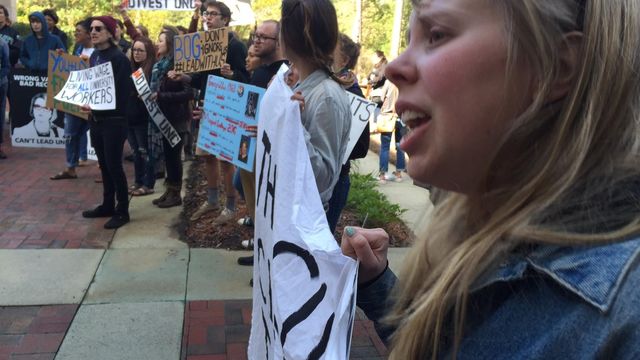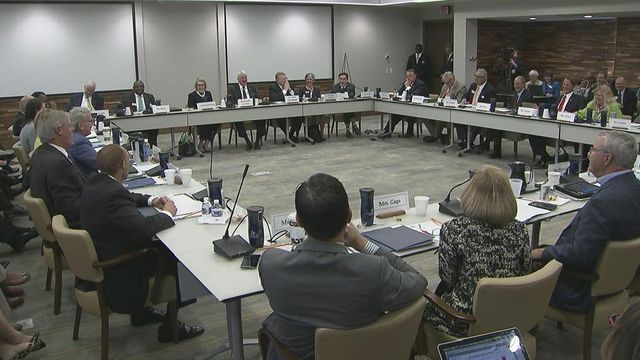Moving Board of Governors meeting doesn't deter protesters
Protesters on Friday again forced the University of North Carolina Board of Governors to halt its monthly meeting.
Posted — UpdatedMore than 50 protesters held signs and chanted on the Chapel Hill campus before 9 a.m., when the meeting was scheduled to begin, and about 20 moved inside when UNC President Margaret Spellings began to speak. Their shouting and chanting slogans forced Chairman Louis Bissette to recess the meeting.
"Tell me what democracy looks like. This is what democracy looks like," the group chanted as board members left the meeting room.
"I particularly don’t like the rudeness and lack of common decency a number of these protestors have, but I understand it – I’m a big boy," Bissette said. "These people out there aren’t advancing their cause. They’re out there screaming, screaming vulgarities. It would be a lot better, it seems to me, if they came in and said, 'These are our issues, and we’d like to talk about it with you.'"
Femi Shittu, a senior at UNC-Greensboro, said the protests are the only way the students will be heard.
"I think it’s the only way to get our points across and be heard because we are shut out in the decisions made for us," Shittu said. "If there were other alternatives and people were more communicative, we’d be receptive, but they’re not."
Bissette noted that the Board of Governors will begin including a public comment period during their meetings next month, which he said he hopes will lead to more dialogue and fewer protests.
About 40 law enforcement officers were at the meeting as a precaution, but no arrests were made. After a while, the protesters left voluntarily, and the meeting resumed.
The Board of Governors had been scheduled to meet at UNC-Asheville, but the meeting was shifted to Chapel Hill because even larger protests were expected in Asheville against House Bill 2, which sets North Carolina's discrimination policy, and Spellings, who has been a target for criticism since she was chosen last fall to lead the school.
"To the protestors who have devoted their time and energy to criticizing me, I say, 'I hear you.' What I ask from you is that you hear me and this board," Spellings said. "(The demonstrations) too often have served to distract us from the mission rather than elevate it."
As she has several times in the past week, Spellings expressed concern over House Bill 2 and the impact it has on the UNC system.
"The chancellors tell me we are great risk of losing faculty, students," she said.
"I don’t think the impact of it has been good for our state," Bissette said of the law, adding that the universities still have to abide by it.
"The university system, we didn’t have anything to do with this," he said. "Yet, somehow we’ve been thrust into the middle of this thing. I think it’s unfair. We’re here trying to do our job and educate people, and to be placed in the middle of things like it’s something we did, when we didn’t, I think it's unfair."
• Credits
Copyright 2024 by Capitol Broadcasting Company. All rights reserved. This material may not be published, broadcast, rewritten or redistributed.






